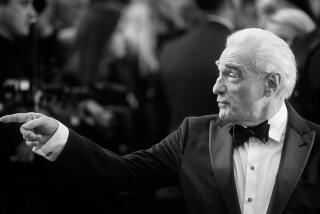Exorcising His Dark Side : Television: Paul Schrader has spun many morality tales of the outcast as hero. With his new HBO film ‘Witch Hunt,’ he abandons the doom and gloom and goes for laughs instead.
LOS ANGELES — In the HBO movie “Witch Hunt,” a righteous senator cut from the cloth of Joseph McCarthy rails against the infestation of witches and sorcerers in Hollywood. The time is 1953, and the setting is an alternative Los Angeles reality, where magic, necromancy and voodoo are common societal practices.
In the original script, written by Joe Dougherty, the tough-talking Sen. Larson Crockett was literally supposed to erupt from his skin at the end of the movie and reveal himself as a hideous, hypocritical monster transformed by his own powerful black magic.
But that touch wasn’t quite right for the film’s director, Paul Schrader, whose screenplays for director Martin Scorsese in the 1970s and 1980s resulted in some of the industry’s most compelling films--”Taxi Driver,” “Raging Bull,” “The Last Temptation of Christ.” These days, Schrader just wants to lighten up and show Hollywood executives that he’s a versatile talent who can handle comedy and special effects, two of the most popular elements of commercial filmmaking today.
So Schrader rewrote the end of “Witch Hunt,” which is scheduled to premiere on HBO in December. Now when the senator’s secret identity is revealed, it’s something funnier than it is macabre.
“HBO offered me this comedy. Well, it wasn’t quite so much a comedy as it is now,” said Schrader, 48, smoking a cigarette in an office at the old hollowed-out Lawry’s plant in Los Angeles, where “Witch Hunt” recently wrapped filming. “It has become a comedy. It was originally a kind of film noir parody with special effects.”
In “Witch Hunt,” the sequel to an earlier HBO movie called “Lovecraft,” Dennis Hooper takes over the lead role (formerly played by Fred Ward) of a gumshoe detective who disdains magic a1852055664ion.
Directing assignments have been tough to come by for Schrader these days. He literally invested his life savings to get his last film, “Light Sleeper,” off the ground two years ago after 28 companies turned down the script. The young wave of movie-studio executives aren’t aware of him, Schrader believes, and he wants to use “Witch Hunt” to demonstrate that he’s no longer the brooding filmmaker his resume suggests.
As an artist with Dutch Calvinist roots and a pervading sense of guilt, Schrader has spun many dark morality tales about outsiders struggling to fulfill a calling. The famous loners he both wrote and directed include Richard Gere as the narcissistic “American Gigolo” in 1980, Ken Ogata as Japan’s suicidal artist “Mishima” in 1985, and Willem Dafoe as a reformed cocaine abuser in “Light Sleeper.”
“Ever since I left Los Angeles, which is about 12 years ago now, I’ve been doing these relatively personal films, on a smaller and smaller scale,” said Schrader, who lives in Westchester County, N.Y., with his wife, actress Mary Beth Hurt, and two young children, Sam and Molly. “It’s been getting harder and harder for me to raise money. It just occurred to me this year that I had been away too long, and there was a whole generation of young executives who never had met me personally, who didn’t know what I was like.”
“We’re in a city where I doubt very seriously if they know who Paul Schrader and Dennis Hopper are,” concurred Hopper, whose own storied 25-year career as an actor and director has been largely obscured by the resident wackos he mostly portrays now, from the mad bomber in “Speed” to the villainous Deacon in Kevin Costner’s upcoming $100-million “Waterworld.”
“I mean, they’re so young,” Hopper said. “They don’t know where we came from and how we got here. Most of them, unfortunately, are corporate raiders, in my opinion, who are more interested in how much stock they can steal at the end of it all, and they don’t want to make any mistakes. The way not to make mistakes is only to take people who have had success. So ‘you’re only as successful as your last movie’ is basically the criterion they’re still running their business on.”
Schrader said he co-wrote and had a deal to direct “City Hall,” a legal thriller about scandalous New York City politics. But he couldn’t get a star for the film, which went through two major rewrites and was bounced from studio to studio. “The studios, with the exception of special-effects films and children’s pictures, are simply in the job of catering to the major stars at this point,” he said.
When Oliver Stone’s “Noriega” was scrapped, Al Pacino showed interest in playing the project’s slick New York mayor. But Schrader was paid a kill fee not to direct in order to make room for the director of choice, Harold Becker, who worked with Pacino on “Sea of Love.” “City Hall” begins filming for Castle Rock Entertainment in October with Pacino, John Cusack and Bridget Fonda.
Of Hollywood executives, with whom Schrader simply has a hard time getting a meeting these days, he said: “They simply associate me with the D-word, which is the current curse word, dark . So that ends any conversation. If you want to dismiss a film, an actor, a director, a writer--out of hand, in a meeting--all you say is, ‘He’s dark.’ Then they move on to another subject. Conversation ended. So I had to do something that got me out of that pigeonhole.”
With that in mind, Schrader set out to eliminate any sense of gloom and doom from “Witch Hunt.” He started by rewriting parts of the script to remove the Raymond Chandler-type elements. Schrader moved the post-war time period of the original script up to the early 1950s, a sort of hipster era “after film noir and before the happy days,” which he calls “California cool.”
Then he recruited a wildly eclectic cast who jumped at the chance to work with Schrader, even though it meant slight wages. In addition to Hopper, there’s monologuist Eric Bogosian, Penelope Ann Miller (“Carlito’s Way”), Julian Sands (“Boxing Helena”), Sheryl Lee Ralph (nominated for a Tony in Broadway’s “Dreamgirls”), Debi Mazar (“GoodFellas”) and the transvestite entertainer Lypsinka.
In some ways, “Witch Hunt” is a perfect metaphor for Schrader, who believes all the digital advancements in Hollywood are more technical than magical. Sen. Crockett’s slogan, splashed on a huge banner, is “No More Magic in Hollywood.” Schrader laughed recalling the catch phrase.
“He’s trying to rid Hollywood of the pernicious influence of magic,” he said. “So his crusade against magic has a double resonance, because there are a lot of people who feel movies were once more magical. But in either case, I’m trying to keep my tongue in my cheek and my feet off the soap box. So you will not get me to say anything pompous about this movie.”
And what about the Schrader of old, whose tortured characters have become part of film history? He’s leaving them behind, with no regrets.
“Well, I’m a middle-aged man with a family,” he explained. “I think the existential hero has pretty well run his course for the moment. He’s been around for 100 years and, I don’t know, maybe I’ll go back to him one day. But after ‘Light Sleeper,’ I started to feel that maybe, you know, it’s time to hang him up for a while--the lonely man in his room. I’m just moving on. It comes with living with children in the suburbs, and being a different age, and having a different sense of mortality.”
”
If you want to dismiss a film, an actor, a director, a writer--out of hand, in a meeting--all you say is, ‘He’s dark.’ ”
More to Read
Only good movies
Get the Indie Focus newsletter, Mark Olsen's weekly guide to the world of cinema.
You may occasionally receive promotional content from the Los Angeles Times.









